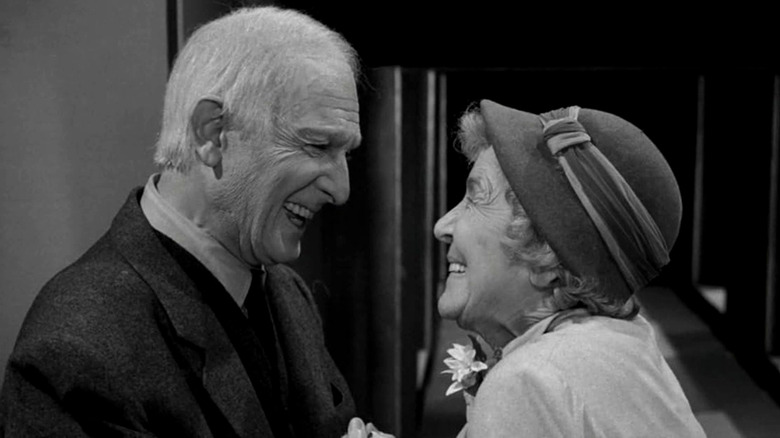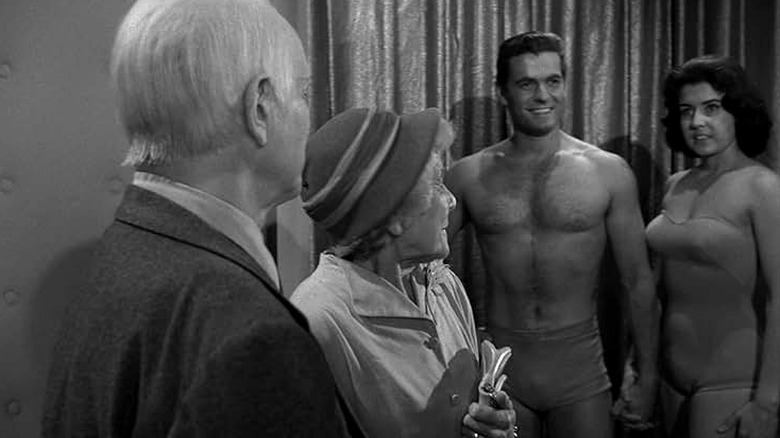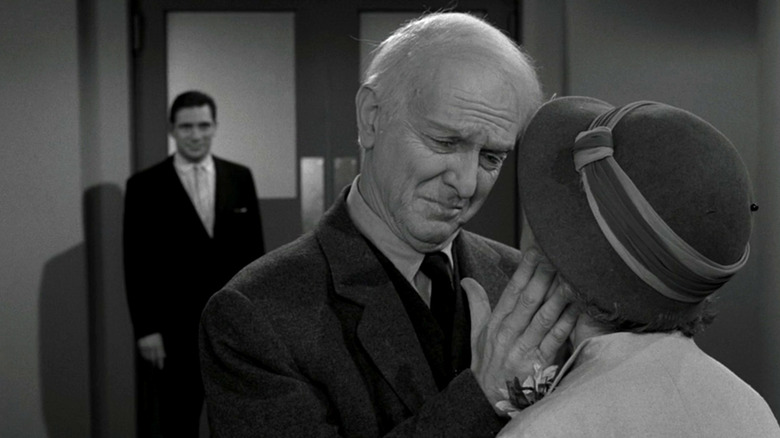The Twilight Zone Unknowingly Cast An Actor Who Was Really Living The Episode's Story
We may receive a commission on purchases made from links.
Look close enough at "The Twilight Zone" and it's clear that events surrounding the making of the show were often as unusual as its otherworldly subject matter. It's not that Rod Serling's science fiction classic was cursed: rather, production of the deeply humane series was often interrupted by deeply human moments. In season 1, for example, an actor passed away mid-shoot, and Serling paid out of pocket to reshoot his scenes so he wouldn't appear ill in his final performance.
Actor Joseph Schildkraut appeared twice in "The Twilight Zone" season 3. In an episode titled "Deaths-Head Revisited," he played the ghost of a Holocaust victim who is given an opportunity to exact justice when the SS captain who murdered him returns to Dachau concentration camp, many years after the war. The episode was written by "Twilight Zone" creator Rod Serling and had personal resonance for him, a Jewish man who had been left both physically and psychologically scarred by his military service in World War II. (Another Serling-scripted episode saw the ghost of Adolf Hitler living on through hatred and bigotry.) It was also heavy subject matter for Schildkraut, an Austrian-born Jewish actor. Schildkraut had previously played Otto Frank in both the stage and screen adaptations of "The Diary of Anne Frank," exchanging letters with the real Otto Frank as part of his preparation for the role.
It was Schildkraut's second episode of "The Twilight Zone," though, that truly echoed his own life in a devastating way. While filming "The Trade-Ins," in which he played a man confronted with the possibility of living without his beloved wife at his side, Schildkraut endured the death of his real-life wife, to whom he'd been married for 30 years.
The Trade-Ins is about an elderly couple looking to restore their youth
"The Trade-Ins," and it explores the idea of mortality through the perspective of an elderly couple who are still deeply in love. Thanks to a new innovative technology, the couple, John and Marie Holt (Joseph Schildkraut and Alma Platt), are given the opportunity to trade in their bodies for younger, newer models. This opportunity is of particular urgency for John, whose health is failing him and is living with great physical pain. However, they only have enough money for one of them to undergo the procedure. After trying and failing to win enough money for a second "trade-in" body in a poker game, John accepts Marie's urging to go first so that he can be free of his pain.
John is euphoric at what his new, youthful, pain-free body can do, but he falters when he sees that, instead of being amazed by it, his youthfulness has brought Marie to tears. He decides to "return" the younger body, telling Marie, "If I have to have occasional pain, amen, so be it." When she tries to protest, he seals the deal with a quote from the poet Robert Browning: "Grow old along with me! The best is yet to be, the last of life, for which the first was made."
And so, the pair decide to face old age and death naturally, hand in hand with the one they love most. Though "The Trade-Ins" certainly has some holes in its logic, it's an especially emotional episode of the series. As Marc Scott Zicree's book "The Twilight Zone Companion" explains, there was an unexpectedly heartbreaking reason it hit so hard.
Joseph Schildkraut's wife died while he was filming The Twilight Zone
As episode director Elliot Silverstein later recalled, Schildkraut's own wife was in the last days of her life during shooting. "He was undergoing a tragedy at the time," Silverstein shared. "His own wife was dying." The cast and crew apparently weren't aware of the extent of her illness at the time, but the filmmaker says Schildkraut's second wife, Marie McKay, passed away in the middle of the three-day shoot. McKay died in February 1962, and the episode would air in April of the same year.
As tragic as the circumstances surrounding the shoot were, Silverstein says the lead actor wouldn't take time out to grieve. "He insisted that we not stop production for him," he said in Zicree's book. As he recalled it, "The Schildkraut family was a great theatrical family in Europe — he would finish the film and then mourn. He was in real tears, off-screen." The episode's star did in fact come from an acting family, as the son of stage and early screen actor Rudolph Schildkraut. The experience was surely extremely painful for the younger Schildkraut, but he upheld his family's legacy: when he passed just two years later, he was laid to rest alongside Marie and his parents in Hollywood Forever Cemetery.
This story would be easier to hear if it had some lesson, like an episode of "The Twilight Zone." Instead, it's just a sad case of life imitating art, and as usual, Serling's own words on the matter say it best. In this case, the soulful storyteller actually ended the episode by borrowing a phrase from poet Kahlil Gibran. "Love gives not but itself and takes not from itself," the narrator said. "Love possesses not nor would it be possessed, for love is sufficient unto love." The sweet quotation isn't a lesson, Serling promises, but "just a reminder, from all the sentimentalists in the Twilight Zone."


